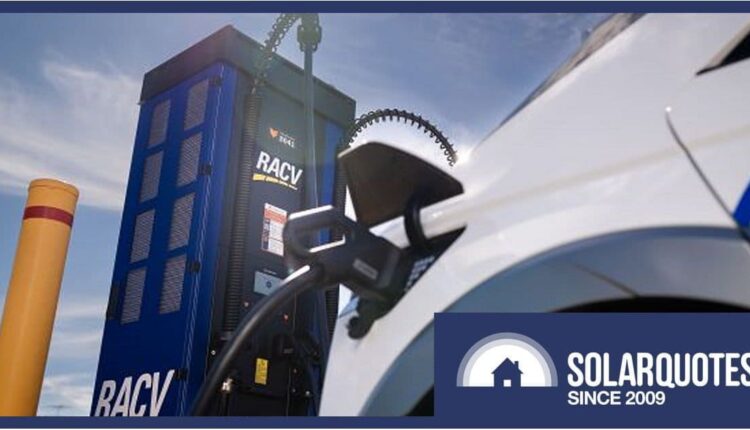RACV storms ahead in electric vehicles, but police beat solar
The Royal Automobile Club of Victoria is celebrating the completion of major upgrades to electric vehicle charging stations across its network, but its solar arm has been scrapped after a regulatory review.
First, on to the more positive news. RACV says it has completed the upgrade of its electric vehicle charging network at its resorts, City Club and public sites across Victoria. These include public electric vehicle charging stations in Ballarat, Barnawartha North, Euroa, Horsham, Moe, Torquay and Airport West. Every public site now has new 50kW and 350kW DC chargers.
New 50kW DC chargers have also been installed at RACV’s Inverloch, Cape Schanck and Healesville resorts. Additionally, the organization’s Healesville, Torquay, Inverloch, Cape Schanck, Goldfields, Noosa and Royal Pines resorts, as well as the City Club, have been upgraded to Level 2 22kW AC chargers (previously 7kW). Even the Noble Park office was upgraded to 50kW DC with a charger.
Security cameras will also be installed at each location to provide a level of security for customers and prevent vandalism to chargers.
“The modernization of RACV’s EV network reflects our continued commitment to helping Victorians get where they need to go safely and efficiently,” said Greg Edye, RACV General Manager Energy Services. “Our focus has been on providing reliable fast charging solutions across Victoria to help RACV members and customers keep their vehicles fully charged throughout their journey.”
The upgrades began in February 2024 and were originally expected to be completed by the middle of this year.
RACV began investing in electric vehicle charging with “slow chargers” at its Victorian clubs and resorts a decade ago. In 2017 the company became a significant shareholder of Chargefox and in 2022 a major shareholder of JET Charge.
RACV Solar pinged by controller
In not so positive news, RACV’s solar division has faced the wrath of the Australian Clean Energy Regulator (CER), whose role (among other things) is to oversee Australia’s Small-Scale Renewable Energy Scheme (SRES). To ensure compliance with renewable energy regulations Energy (Electricity) Act 2000.
Earlier this month, the regulator announced that it had initiated compliance action against registered agents Formbay Trading Pty Ltd and RACV Solar Pty Ltd.
“Between July 1, 2021 and August 5, 2022, RACV Solar submitted false written statements to Formbay claiming that the installation of 28 photovoltaic (PV) solar systems was completed by a specific Clean Energy Council accredited installer or monitored even though these systems were actually installed by another person. Formbay relied on the false information to create 1,945 small technology certificates,” the regulator said.
The value of Small Scale Technology Certificates (STCs), on which Australia’s solar rebate is based, varies depending on market conditions. They have been approaching or approaching their maximum possible value (US$40 each) for several years, but are based on a value of US$39 in 2021/22; The certificates in question would have been worth almost $76,000.
The clean energy regulator noted that both parties had been cooperative in resolving the matter and had accepted enforceable commitments to resolve the issue. This is where things get a little confusing – the only current enforceable RACV obligation listed by the CER only mentions five systems and is dated June 18, 2024.
The obligations of both companies include the development and implementation of compliance programs, inspections and correction of any deficiencies (if any) in the affected systems, as well as the provision of evidence of inspections and corrective work carried out.
RACV Solar was founded in 2019. A few years ago the company embarked on an acquisition spree; Acquisition of solar installation companies Great Ocean Solar and Electrical, Gippsland Solar, Pacific Solar Merimbula and Cola Solar.



Comments are closed.